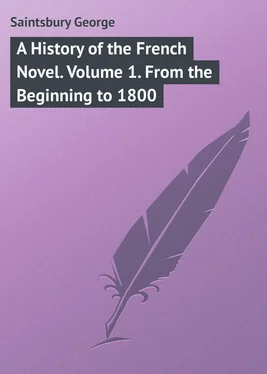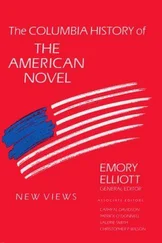George Saintsbury - A History of the French Novel. Volume 1. From the Beginning to 1800
Здесь есть возможность читать онлайн «George Saintsbury - A History of the French Novel. Volume 1. From the Beginning to 1800» — ознакомительный отрывок электронной книги совершенно бесплатно, а после прочтения отрывка купить полную версию. В некоторых случаях можно слушать аудио, скачать через торрент в формате fb2 и присутствует краткое содержание. Жанр: foreign_language, foreign_prose, на английском языке. Описание произведения, (предисловие) а так же отзывы посетителей доступны на портале библиотеки ЛибКат.
- Название:A History of the French Novel. Volume 1. From the Beginning to 1800
- Автор:
- Жанр:
- Год:неизвестен
- ISBN:нет данных
- Рейтинг книги:4 / 5. Голосов: 1
-
Избранное:Добавить в избранное
- Отзывы:
-
Ваша оценка:
- 80
- 1
- 2
- 3
- 4
- 5
A History of the French Novel. Volume 1. From the Beginning to 1800: краткое содержание, описание и аннотация
Предлагаем к чтению аннотацию, описание, краткое содержание или предисловие (зависит от того, что написал сам автор книги «A History of the French Novel. Volume 1. From the Beginning to 1800»). Если вы не нашли необходимую информацию о книге — напишите в комментариях, мы постараемся отыскать её.
A History of the French Novel. Volume 1. From the Beginning to 1800 — читать онлайн ознакомительный отрывок
Ниже представлен текст книги, разбитый по страницам. Система сохранения места последней прочитанной страницы, позволяет с удобством читать онлайн бесплатно книгу «A History of the French Novel. Volume 1. From the Beginning to 1800», без необходимости каждый раз заново искать на чём Вы остановились. Поставьте закладку, и сможете в любой момент перейти на страницу, на которой закончили чтение.
Интервал:
Закладка:
To these five, of whom some substantive notice has been given, many shadowy names might be added if the catalogue were of any use: such as those of Kinwelmersh, Whetstone, Phaer, Neville, Blundeston, Edwards, Golding, and many others. They seem to have been for the most part personally acquainted with one another; the literary energies of England being almost confined to the universities and the Inns of Court, so that most of those who devoted themselves to literature came into contact and formed what is sometimes called a clique. They were all studiously and rather indiscriminately given to translation (the body of foreign work, ancient and modern, which was turned into English during this quarter of a century being very large indeed), and all or many of them were contributors of commendatory verses to each other's work and of pieces of different descriptions to the poetical miscellanies of the time. Of these miscellanies and of the chief translations from the classics some little notice may be taken because of the great part which both played in the poetical education of England. It has been said that almost all the original poets were also translators. Thus Googe Englished, among other things, the Zodiacus Vitæ of Marcellus Palingenius, the Regnum Papisticum of Kirchmayer, the Four Books of Husbandry of Conrad Heresbach, and the Proverbs of the Marquis of Santillana; but some of the translators were not distinguished by any original work. Thus Jasper Heywood, followed by Neville above mentioned, by Studley, and others, translated between 1560 and 1580 those tragedies of Seneca which had such a vast influence on foreign literature and, fortunately, so small an influence on English. Arthur Golding gave in 1567 a version, by no means destitute of merit, of the Metamorphoses which had a great influence on English poetry. We have already mentioned Surrey's blank-verse translation of Virgil. This was followed up, in 1555-60, by Thomas Phaer, who, like most of the persons mentioned in this paragraph, used the fourteener, broken up or not, as accident or the necessities of the printer brought it about.
It was beyond doubt this abundant translation, and perhaps also the manifest deficiencies of the fourteener thus used, which brought about at the close of the present period and the beginning of the next the extraordinary attempt to reproduce classical metres in English verse, which for a time seduced even Spenser, which was not a little countenanced by most of the critical writers of the period, which led Gabriel Harvey and others into such absurdities, and which was scarcely slain even by Daniel's famous and capital Defence of Rhyme . The discussion of this absurd attempt (for which rules, not now extant, came from Drant of Cambridge) in the correspondence of Spenser and Harvey, and the sensible fashion in which Nash laughed at it, are among the best known things in the gossiping history of English Letters. But the coxcombry of Harvey and the felicitous impertinence of Nash have sometimes diverted attention from the actual state of the case. William Webbe (a very sober-minded person with taste enough to admire the "new poet," as he calls Spenser) makes elaborate attempts not merely at hexameters, which, though only a curiosity, are a possible curiosity in English, but at Sapphics which could never (except as burlesque) be tolerable. Sidney, Spenser, and others gave serious heed to the scheme of substituting classical metres without rhyme for indigenous metres with rhyme. And unless the two causes which brought this about are constantly kept in mind, the reason of it will not be understood. It was undoubtedly the weakness of contemporary English verse which reinforced the general Renaissance admiration for the classics; nor must it be forgotten that Wyatt takes, in vernacular metres and with rhyme, nearly as great liberties with the intonation and prosody of the language as any of the classicists in their unlucky hexameters and elegiacs. The majesty and grace of the learned tongues, contrasting with the poverty of their own language, impressed, and to a great extent rightly impressed, the early Elizabethans, so that they naturally enough cast about for any means to improve the one, and hesitated at any peculiarity which was not found in the other. It was unpardonable in Milton to sneer at rhyme after the fifty years of magnificent production which had put English on a level with Greek and above Latin as a literary instrument. But for Harvey and Spenser, Sidney and Webbe, with those fifty years still to come, the state of the case was very different.
The translation mania and the classicising mania together led to the production of perhaps the most absurd book in all literature – a book which deserves extended notice here, partly because it has only recently become accessible to the general reader in its original form, and partly because it is, though a caricature, yet a very instructive caricature of the tendencies and literary ideas of the time. This is Richard Stanyhurst's translation of the first four books of the Æneid , first printed at Leyden in the summer of 1582, and reprinted in London a year later. This wonderful book (in which the spelling is only less marvellous than the phraseology and verse) shows more than anything else the active throes which English literature was undergoing, and though the result was but a false birth it is none the less interesting.
Stanyhurst was not, as might be hastily imagined, a person of insufficient culture or insufficient brains. He was an Irish Roman Catholic gentleman, brother-in-law to Lord Dunsany, and uncle to Archbishop Usher, and though he was author of the Irish part of Holinshed's History , he has always been regarded by the madder sort of Hibernians as a traitor to the nation. His father was Recorder of Dublin, and he himself, having been born about 1547, was educated at University College, Oxford, and went thence, if not to the Inns of Court, at any rate to those of Chancery, and became a student of Furnival's Inn. He died at Brussels in 1618. Here is an example of his prose, the latter part of which is profitable for matter as well as for form: —
"How beyt 10 10 This and the next extract are given literatim to show Stanyhurst's marvellous spelling.
I haue heere haulf a guesh, that two sorts of carpers wyl seeme too spurne at this myne enterprise. Thee one vtterlie ignorant, the oother meanlye letterd. Thee ignorant wyl imagin, that thee passage was nothing craggye, in as much as M. Phaere hath broken thee ice before me: Thee meaner clarcks wyl suppose my trauail in theese heroical verses too carrye no great difficultie, in that yt lay in my choice too make what word I would short or long, hauing no English writer beefore mee in this kind of poëtrye with whose squire I should leauel my syllables.
Haue not theese men made a fayre speake? If they had put in Mightye Joue , and gods in thee plural number, and Venus with Cupide thee blynd Boy , al had beene in thee nick, thee rythme had been of a right stamp. For a few such stiches boch vp oure newe fashion makers. Prouyded not wythstanding alwayes that Artaxerxes , al be yt hee bee spurgalde, beeing so much gallop, bee placed in thee dedicatory epistle receauing a cuppe of water of a swayne, or elles al is not wurth a beane. Good God what a frye of wooden rythmours dooth swarme in stacioners shops, who neauer enstructed in any grammar schoole, not atayning too thee paaringes of thee Latin or Greeke tongue, yeet like blind bayards rush on forward, fostring theyre vayne conceits wyth such ouerweening silly follyes, as they reck not too bee condemned of thee learned for ignorant, so they bee commended of thee ignorant for learned. Thee reddyest way, therefore, too flap theese droanes from the sweete senting hiues of Poëtrye, is for thee learned too applye theym selues wholye (yf they be delighted wyth that veyne) too thee true making of verses in such wise as thee Greekes and Latins , thee fathurs of knowledge, haue doone; and too leaue too theese doltish coystrels theyre rude rythming and balducktoom ballads."
Читать дальшеИнтервал:
Закладка:
Похожие книги на «A History of the French Novel. Volume 1. From the Beginning to 1800»
Представляем Вашему вниманию похожие книги на «A History of the French Novel. Volume 1. From the Beginning to 1800» списком для выбора. Мы отобрали схожую по названию и смыслу литературу в надежде предоставить читателям больше вариантов отыскать новые, интересные, ещё непрочитанные произведения.
Обсуждение, отзывы о книге «A History of the French Novel. Volume 1. From the Beginning to 1800» и просто собственные мнения читателей. Оставьте ваши комментарии, напишите, что Вы думаете о произведении, его смысле или главных героях. Укажите что конкретно понравилось, а что нет, и почему Вы так считаете.












